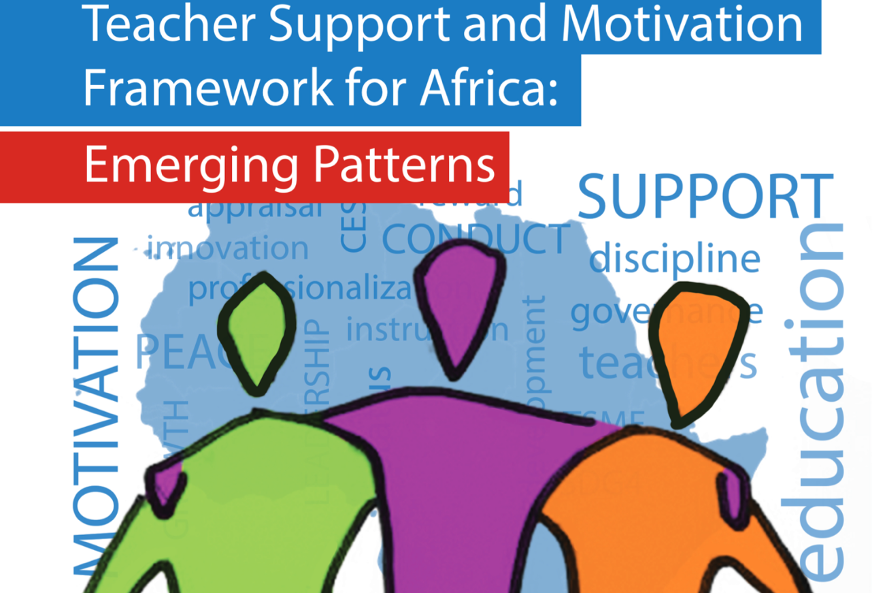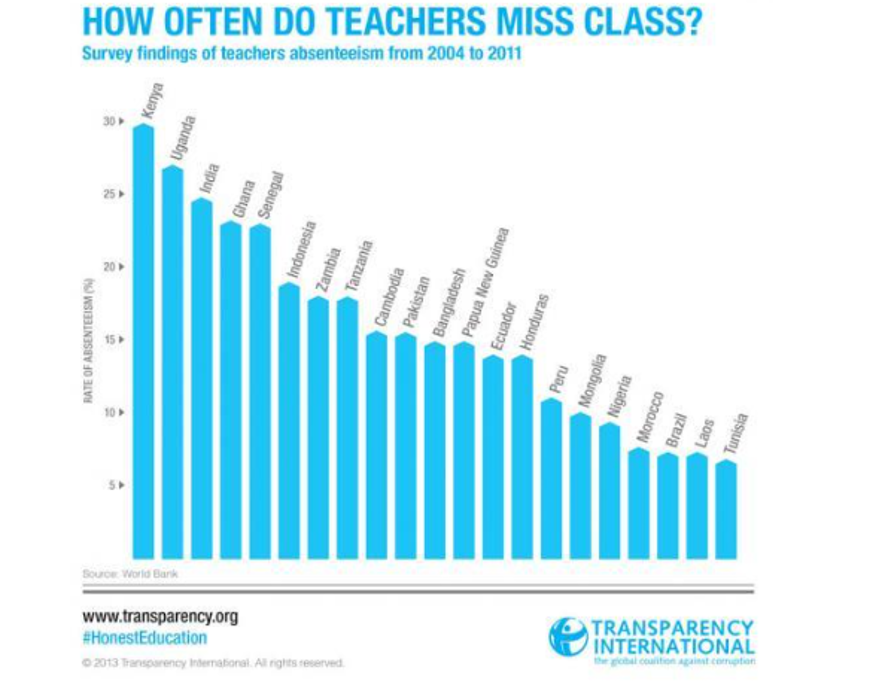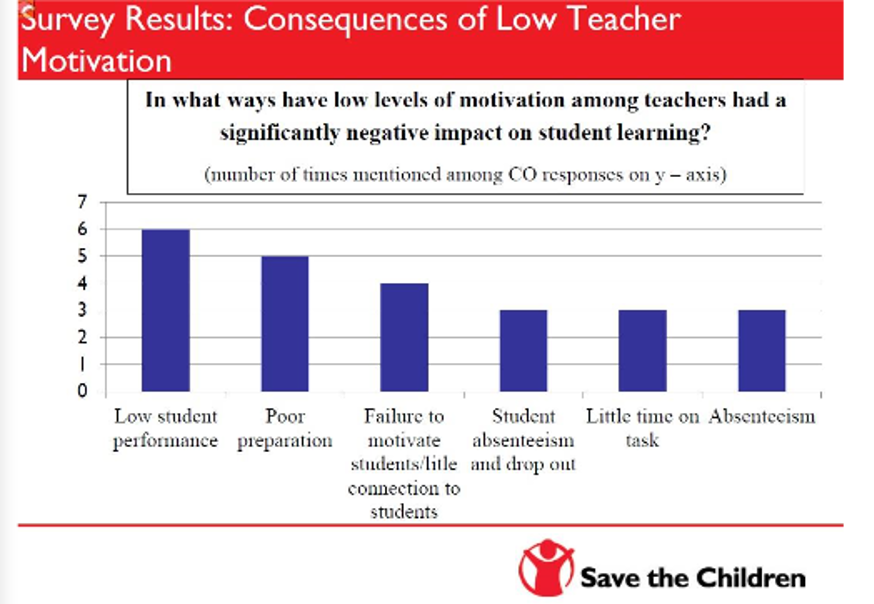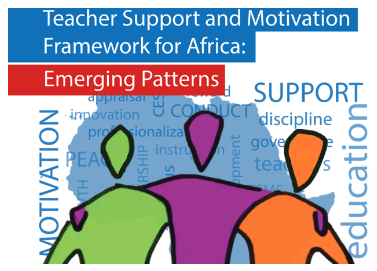The last two decades have seen a sharp increase in interest in teacher motivation in Africa. NGOs such as VSO, 4ActionAid, Save the Children and the Aga Khan Foundation were among the first development partners to document the critical importance of teacher motivation for teaching practice and the quality of education. They conducted several studies in early 2001/2002 in countries such as Tanzania, Rwanda, Democratic Republic of Congo, Uganda, Kenya and Nigeria (among others). They sought to understand what influences teachers on their career choice, the impact of various factors on job satisfaction, their ability to teach and their willingness to stay in teaching.
Establishing quality education in Africa is a top priority for UNESCO. Note that Goal Four of the Sustainable Development Agenda 2030, approved by the United Nations General Assembly, underlines the commitment to ensure inclusive, equitable and quality education, thus promoting learning opportunities for all from a sustainable scenario, in which the role of the teacher is strengthened with a view to optimal implementation of the teaching and learning process.
At education policy level there is a great deal of interest in teacher motivation. This is due to the high levels of school dropout rates and dropouts among teachers in Africa, their low professional commitment to teaching tasks, and the massive shortage of teachers. The need to adequately remunerate teachers, develop a quality teaching process, and keep teachers in the profession are urgent and constant policy issues on the development agendas of these regions.
On 5 October 2016, UNESCO International Institute for Capacity Building in Africa (UNESCO-IICBA), in collaboration with the African Union Commission (AUC), Education International (EI), the International Labour Organization (ILO) and the Association for the Development of Education in Africa (ADEA), held a one-day seminar on supporting and motivating teachers at the African Union Conference Centre in Addis Ababa. At the event, UNESCO-IICBA presented the publication entitled: Teaching Policies and Learning Outcomes in Sub-Saharan Africa.
Teachers play a pivotal role in facilitating a quality teaching and learning process. Building positive educational environments at the school level is paramount. To do this, it is necessary to take into account the factors that drive teacher motivation:
- The regional context in the evolution of education. Teachers have different motivations to join the profession, which vary based on contextual considerations and other more personal factors. A very significant proportion of teachers, especially at the primary level, have low levels of job satisfaction. This is due to instability, the location of schools and precarious working conditions. Teachers and unions insist they have long been dissatisfied with pay and working conditions.
- The motivation of the teacher, the school, the location, the environment and the culture. Teachers stress that they accept large workloads with few resources. Educational difficulties predominate in impoverished rural areas. Schools experience the following difficulties:
- Schools with few students due to high levels of child labour in agriculture.
- Nomadic populations continually on the move.
- Limited infrastructure.
- Entrenched cultural practices.
- Malnutrition among students.
- Diseases such as HIV/AIDS.
All these factors disrupt the teaching and learning process. This context is a determining factor that directly influences teachers’ motivation.
- Teacher motivation and the socio-economic aspects at play. Among the demotivating factors relating to socio-economic aspects are the following:
- The low pay teachers receive is not sufficient to meet their needs. Hence, many of them have to resort to combining their teaching with a second job as a salesperson, taxi driver, etc. This is demotivating and leads to teachers being absent from the educational process.
- The distance teachers must sometimes travel to remote rural schools and the lack of transportation and infrastructure causes absenteeism. In countries such as Zambia, teachers in remote rural areas may spend up to half their salary on transport and accommodation.
- Low percentage of women teachers due to harsh working conditions in rural areas. In Uganda, for example, women make up 57% of teachers, with only 5% taking up the job in rural areas. Despite the availability of qualified women teachers, they are forced to turn down positions in remote locations.
- Teacher motivation and the HIV/AIDS epidemic. The impact of this disease on education systems has reduced the supply of educators in Africa. In Zambia in 2000, 45% of primary school teachers died of HIV.
- Teacher motivation, instability and post-crisis situations. Crises and post-crisis situations are important, as they affect the social, emotional and physical well-being of teachers. Teachers with outward signs of trauma after a crisis lack forums in which to feel supported.
All this ends up leading to a combination of low student performance, inadequate training, poor connection with students, absenteeism, and other consequences.
Information about the context, conditions in each country, and data on the quality of implementation, are necessary to understand the policies and measures required. Notable among these measures is the monitoring of teacher motivation, which entails:
- Mobilising knowledge.
- Ensuring that stakeholders have access to this knowledge by shifting decisions on teacher motivation to the local and national level.
- Ramping up funding, investment in teacher motivation initiatives, etc.
Non-governmental organisations generally implement their own approach to monitoring and evaluating teacher motivation strategies and outcomes. This presents a major challenge, not only in terms of the quality of the assessments and associated reports, but also in developing a knowledge base about what works and what does not work in these scenarios. A good understanding of the environment in each region is fundamental for building these monitoring processes.
After learning about the educational outlook in Africa, UNESCO-IICA developed a Teacher Support and Motivation Framework (TSMF) for the continent.
The main challenge is to help teachers grow, to motivate them and to develop their skills and conditions by providing quality education.
Research to address this challenge began in 2017, following the publication of Teacher Support and Motivation Framework for Africa: Emerging Patterns. The publication offered an analytical and critical view of the educational landscape and the role of teachers in Africa. This document was the result of the first phase of research.
It included various future initiatives throughout Africa for school improvement and the professional development of teachers:
- Offer psychosocial and emotional support to teachers in post-crisis situations.
- Help teachers in rural or remote areas to overcome feelings of isolation or lack of connectedness to other teachers in the professional community.
- Provide support to teachers, especially newly qualified teachers, to feel less overwhelmed.
- Create more supportive and safer environments for female teachers and challenge gender role.
- Open up opportunities for autonomy and self-actualisation in the classroom, overcoming teaching/learning barriers in each country.
- Help teachers to cope with issues related to class size.
Motivating African teachers has become a goal of global interest. However, their motivation is at such low levels, and so many factors act as barriers, that it has been necessary to explicitly incorporate it as one of the 2030 Agenda SDGs and the objectives of CESA (Continental Education Strategy for Africa) 2016-2025.
Access the full document for more information:
Are you involved in any initiative that aims to ensure learning continuity during the global Covid-19 crisis? Share your initiative HERE!









